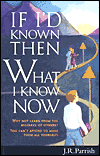
Everyone Needs to Feel Important
The first key is to recognize the fact that every human being's greatest need, after food, clothing, and shelter, is the need to feel important.
By understanding and applying this key to success, you'll put yourself in a position to succeed with people in every aspect of your life. Won't it be nice to know exactly what to do to win with others? Your success and your happiness depend on your ability to get along with others.
In his book, How to Have Confidence and Power in Dealing with People, Les Giblin makes the point that most failures in the business world are failures in human relations. I can tell you that learning effective human-relations skills completely changed and dramatically improved my life. Since getting along with people is crucial, it's important to learn how to get along early in your life. Human-relations skills should be taught from kindergarten through college.
Your success with everyone you meet will depend on your ability to satisfy his or her need to feel important. How do you feel when someone asks your opinion, lets you go first, gives you the best seat, offers you the last piece of candy, smiles at you, brings you a gift, or sends you a thank-you card? How about when they compliment you, encourage you, praise you, speak well of you in front of others, and show you they need and value you? Does this describe the kind of person you want to be around? These are the behaviors you must emulate if you want to he successful, happy, and popular.
How do you feel when someone interrupts you, mocks you, or frowns at what you say? What if they don't show appreciation for something you did for them, talk down to you, don't listen to you, disregard your opinions, make you feel stupid, or never let you go first? Does this describe the kind of person you want to be around? This is the person you can't afford to be if you want to win with others and succeed.
If you want to read more deeply on the subject, I recommend Les Giblin's How to Have Confidence and Power in Dealing with People. It's the best book I've ever read on human relations, and it changed my life.
The Willingness to Form Good Habits
The second key to success and happiness is your willingness to form good habits.
The biggest difference between those who succeed and those who fail lies in their habits. Your habits control you more than anything else does. If you acquire good habits and eliminate your bad ones, you'll succeed beyond your wildest dreams. Everyone is a slave to his habits, good or bad. You see proof of this everywhere that you look. Aren't the spendthrift and the person with poor hygiene slaves to their habits? How about great athletes, musicians, and successful businesspersons? The habits that enslave you include smiling or frowning, being positive or negative, having a good or poor attitude, and being energetic or lazy. If you're a slave to your habits, and if your habits determine your success or failure, you'd better learn to become a slave to good habits.
Some of the habits I formed that insured my success and happiness were minimizing debt, maintaining a positive attitude, smiling, letting others go first, and becoming hurry-free.
Additionally, I made my word good regardless of the cost, became meticulous, and learned patience, humility, and how to control my weight. There's a very easy-to-read book on the subject that changed my life and thousands of others. I highly recommend The Greatest Salesman in the World, by Og Mandino and don't be fooled by the title.
The Better World Theory
The third key to your success is what I call "The Better World Theory."
I call it that because, if you want a better world for yourself, you must stop blaming anyone else and take full responsibility for every aspect of your life. No matter what you're unhappy about, it's up to you if you want it to change. If you want a better world, you must make it so. Start by accepting the fact that no one else is to blame for your problems. When you live like this, you gain peace of mind. Any time you blame others for your problems, you're denying responsibility for your own life -- and asking for trouble and heartache.
If you start to blame your problems on your spouse, your parents, your friend, or your employer, remember that you're in each of these circumstances by your own choice. Since you made the decision to be in each situation, there is simply no one to blame. Your motto must become If it's to be, it's up to me.
I learned the better world theory in 1968, when I was in the milk business. One of our route men was about sixty, and had been at the dairy for thirty years. Frequently, he would have too much to drink and fail to show up for work. On my days off, I'd have to get up at three in the morning to go load his truck and deliver his milk. I soon found myself complaining that the guy was ruining my life. I was told that it was my problem, not his. How could it be my problem? It was explained to me that I was in charge, and, inasmuch as one of my men wasn't doing his job, it was up to me to deal with it -- or quit complaining. I could fire him, fine him, quit, or let it go, but I couldn't blame him.
I resolved the problem by asking him to retire. Now I know that whenever I have a problem, it's up to me to solve it. There's no one else to blame for your problems.
Implementing The Better World Theory
While I'm on the subject of blame, I'll share something I find quite profound. When you implement the better world theory, you eliminate most of the anger from your life. Nearly all anger distills down to blame. If you eliminate blame, you begin to eliminate anger. Anger is just one letter short of danger. The next time you feel angry, stop and ask yourself, "Whom am I blaming"?
Genetics play a role in both your physical and mental health. The chemicals in our brains are not all the same, and our behaviors can vary a great deal. Sometimes, it takes more than willpower to make a desired improvement. Many people can have one drink and be satisfied, while others can't stop until they're drunk. Some people can be moderate in their food intake, but some cannot. If you're among those who can't, it's better to get professional help than to try going it alone.
Reprinted with permission of the publisher,
Cypress House. ©2003. www.cypresshouse.com
Article Source
If I'd Known Then What I Know Now: Why Not Learn from the Mistakes of Others? You Can't Afford to Make Them All Yourself
by J.R. Parrish.
 If I'd Known Then What I Know Now is an inspiring, Pay It Forward-type manifesto for achieving success and happiness from childhood to retirement. Equally suitable for anyone from eight to eighty, it is actually a life guide or map that will help the reader traverse the roads of life, showing how to avoid the mindfields and grab the gold ring by making the best choices when facing life's most important decisions. iParenting Award winner.
If I'd Known Then What I Know Now is an inspiring, Pay It Forward-type manifesto for achieving success and happiness from childhood to retirement. Equally suitable for anyone from eight to eighty, it is actually a life guide or map that will help the reader traverse the roads of life, showing how to avoid the mindfields and grab the gold ring by making the best choices when facing life's most important decisions. iParenting Award winner.
Info/Order this book.
About the Author
 When J.R. Parrish was two years old, his mother left him with his paternal grandmother and he never saw her again. At seven, he sold flower seeds for spending money, and had a paper route at ten. At eleven, he began living with his father (a navy man), stepmother, and three half brothers. J.R. baby-sat, mowed lawns, and pumped gas to earn his way. He became the top salesman in the USA for a Fortune 500 company at twenty-six, was in the top five nationwide for Xerox at twenty-eight, and started his own commercial real estate company in Silicon Valley at thirty-one. J.R. retired in Hawaii at age fifty-five.
When J.R. Parrish was two years old, his mother left him with his paternal grandmother and he never saw her again. At seven, he sold flower seeds for spending money, and had a paper route at ten. At eleven, he began living with his father (a navy man), stepmother, and three half brothers. J.R. baby-sat, mowed lawns, and pumped gas to earn his way. He became the top salesman in the USA for a Fortune 500 company at twenty-six, was in the top five nationwide for Xerox at twenty-eight, and started his own commercial real estate company in Silicon Valley at thirty-one. J.R. retired in Hawaii at age fifty-five.

























